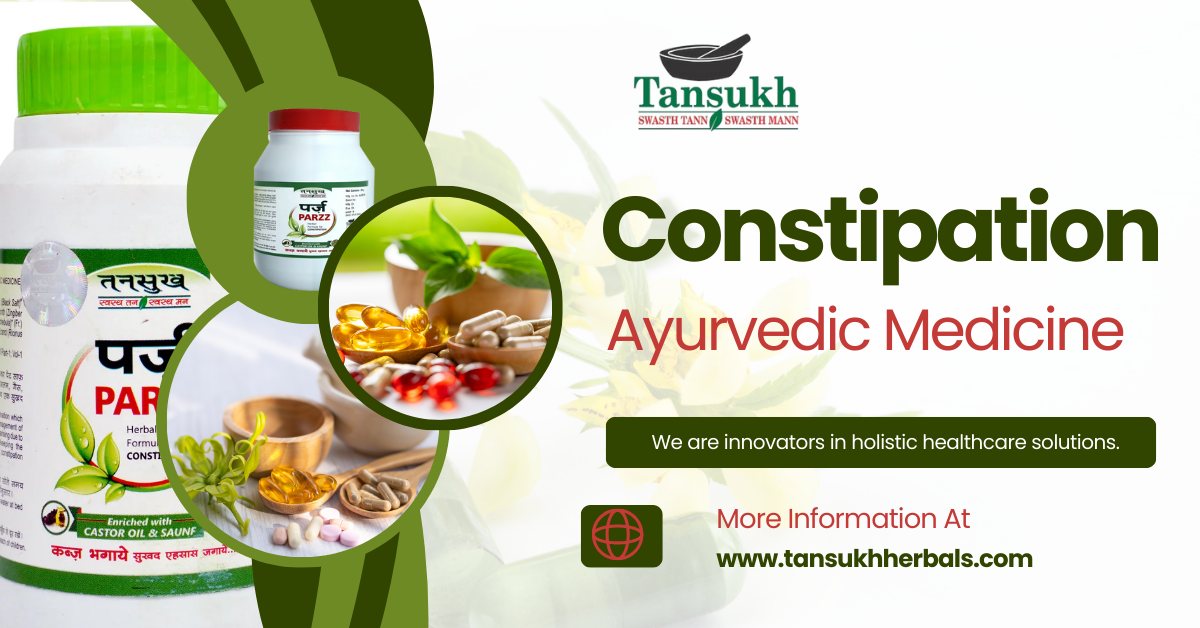A state when an individual faces infrequent bowel movements or has less than three stools each week and stools become hard to pass, then he suffers from constipation. Ayurvedic medicine for constipation will mainly work on the root cause of the problem. So sometimes, they may see slow results. But with the proper selection of medicines and the right instructions to use them, you will get permanent relief from constipation.
Parzz is the best Ayurvedic medicine for constipation.
It is a well-known Ayurvedic medicine that has been trusted by many for years to address issues related to constipation. This Ayurvedic remedy has been formulated making use of a mixture of potent herbal ingredients that are known for their digestive properties. This medicine is designed to effectively and gently ease constipation, giving relief without any severe side effects.
What is constipation?
Constipation is classified as a type of vata disorder in Ayurveda. It is because the vatic doshas are meant to bring balance in the movement of waste particles and eliminate them from the body. The vata doshas’ dry, cold, and hard qualities disturb the colon. Thus it inhibits them from functioning properly. The different conditions that enhance this dosha are cold weather, unhealthy foods, dehydration, stress, drinking alcohol, smoking, some medications, dehydration, and hormonal irregularities. They tend to worsen the symptoms.
How does constipation happen?
The primary job of your colon is water absorption from residual food as it will pass through the digestive system. Then it creates waste or stool. When the colon absorbs a lot of water from waste or stool, it dries out this stool. Thus it has a hard consistency. It is challenging to excrete it from the body. Eventually, the muscles of the colon push out the waste through the rectum for elimination. If stool stays for too long in the colon, it will become difficult and hard to pass.
Stages of Constipation
Normal-transit constipation: It is accompanied by difficulty to pass stool, straining, and a feeling of urgency.
Slow-transit constipation: It is accompanied by complex, dry stools. They are hard to pass. You may also feel full after having your meal and be bloated.
Pelvic floor dysfunction constipation: It is accompanied by a feeling of rectum obstruction, pain at the time of bowel movements, and improper evacuation.
What causes constipation?
Lifestyle choices, medical conditions, and medications are some of the causes of constipation.
Common lifestyle choices that cause constipation are:
Eating low-fiber food.
Not having sufficient water.
Not doing enough exercise.
Resisting an urge to have any bowel movement.
Stress.
Having huge amounts of cheese or milk.
Changes in regular routine like traveling or going to sleep at various times or eating.
Medical conditions that cause constipation are:
Irritable bowel syndrome
Endocrine conditions such as underactive thyroid gland, hypercalcemia, and diabetes.
Intestinal obstruction
Neurological disorders
Pregnancy
Multiple organ disease
Medications that cause constipation are:
Powerful pain medications such as narcotics that contain codeine, hydromorphone, and oxycodone.
Non-steroidal anti-inflammatory medicines such as naproxen and ibuprofen.
Iron pills
Antacids that contain aluminum or calcium.
Allergy drugs like antihistamines.
A few blood pressure drugs such as beta-blockers and calcium channel blockers.
Psychiatric drugs such as olanzapine and clozapine.
Anti-nausea drugs such as ondansetron.
Anticonvulsant or seizure drugs like gabapentin and phenytoin.
Symptoms of constipation
You will have less than three bowel movements in a week.
You have stools that are painful or difficult to pass.
You suffer from stomach cramps or aches.
You feel nauseous and bloated.
Your stools become hard, dry, or lumpy.
You have a feeling that you were not able to completely empty your bowel after a movement.
How to Avoid Constipation?
Have a lot of high-fiber-containing foods. Include veggies, beans, fruits, bran, and whole-grain cereals in your daily diet.
Eat lesser food containing low fiber amounts. These are meat and dairy products along with processed foods.
Drink a lot of fluids.
Manage stress properly.
Try staying as active as you can. Exercise regularly.
You should not ignore your urge of passing stool.
Create a daily schedule for bowel movements. You should do it mainly after having your meal.
Ensure that kids who start to eat solid food have plenty of fiber included in their diets.
Ayurvedic medicine for constipation
A holistic approach to wellness and health is known as Ayurveda. It emphasizes on a balance between body, spirit and mind. It is one of the most respected and oldest medicinal traditions worldwide. Today it is widely practiced not only in India where it originated but also globally.
Ayurveda is focused to prevent disease. So its approach to treating constipation encompasses a wide range of healthy selections instead of solely focusing on immediate ease and laxatives. Apart from natural laxatives, a complete Ayurvedic diet, massage and exercise are the main elements that will help in maintaining a healthy digestive system.
Tansukh Herbals has an effective solution for constipation known as Parzz. It is made from a blend of traditional Ayurvedic herbs that are selected carefully for their digestive benefits. Its main ingredients are Kala Namak, Saunf, Sonth, Chhoti Harad, Sanay, and Erand. All these ingredients are renowned for their natural digestive, laxative, and carminative properties.
This medicine’s carefully created herbal formulation will offer natural assistance from digestive discomfort, and be beneficial for your gastrointestinal health. If your doctor recommends you use this Ayurvedic medicine for constipation, take it before bedtime. Use warm or lukewarm water and have 5-10 grams of it. The shelf life of Tansukh Parzz is of 24 months. To become aware of the specific manufacturing and expiry date check the packaging properly.
Effectiveness:
It will relieve constipation.
This medicine will promote regular bowel movements.
It will support healthy digestion.
It will improve gastrointestinal health.
This Ayurvedic medicine for constipation will help to reduce bloating and discomfort that are related to constipation.
It will nourish and tone the digestive system. Thus it will aid overall health.
Is it safe to use this medicine?
This medicine makes use of natural ingredients. But it may be suitable for only a few people.
Pregnant or lactating women or people having other medical issues or using prescription drugs, should not use Parzz.
You need to go through the product label thoroughly.
You must follow the prescribed dose instructions.
Conclusion:
An Ayurvedic approach to treating constipation or maintaining good digestive health involves drinking enough water, having more vegetables and fruits, and doing a lot of physical exercise such as yoga. You can achieve short-term relief making using natural Ayurvedic laxatives or using medicated oil massage. But the best way to get treat constipation is using an Ayurvedic medicine for constipation that is Tansukh Parzz. Its price is budget-friendly. You can buy it online from Tansukh Herbals. You can also check retail sites such as Flipkart and Amazon. You can it over the counter if you visit the nearest Ayurvedic store.



